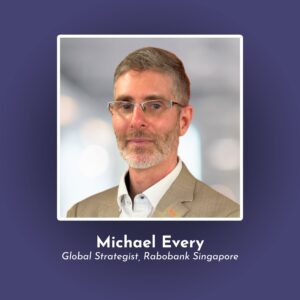
Show Summary
On this episode, Nate is joined by financial analyst Michael Every to discuss global macro trends in economics, politics, and social movements. By taking a wide-view lens of current events, we can better see how seemingly isolated events interconnect and what mainstream economic theories tend to miss. What do rising political tensions and dissatisfaction around the globe amidst increasing GDP tell us about the accuracy of our economic measures? How much are geopolitical conflicts and supply chain disruptions contributing to current inflationary pressures? And what can we learn from current economic models as we steer towards a new system with lower energy throughput in a multipolar world?
About Michael Every
Michael Every is Global Strategist at Rabobank Singapore analyzing major developments and key thematic trends, especially on the intersection of geopolitics, economics, and markets. He is frequently published and quoted in financial media, is a regular conference keynote speaker, and was invited to present to the 2022 G-20 on the current global crisis. Michael has lived and worked in 9 countries and been in the industry for nearly 25 years, with previous roles at Silk Road Associates, the Royal Bank of Canada, and Dun & Bradstreet. He holds a BA from Lancaster University, and a master’s degree from University College London.
In French, we have a motto that says that a simple drawing is often better than a long explanation. Jean-Marc Jancovici Carbone 4 President
That’s very understandable because with left atmosphere thinking, one of the problems is that you see everything as a series of problems that must have solutions. Iain McGilchrist Neuroscientist and Philosopher
We can’t have hundreds and hundreds of real relationships that are healthy because that requires time and effort and full attention and awareness of being in real relationship and conversation with the other human. Nate Hagens Director of ISEOF
This is the crux of the whole problem. Individual parts of nature are more valuable than the biocomplexity of nature. Thomas Crowther Founder Restor
Show Notes & Links to Learn More
Download transcript00:00 – Michael Every Works + Info, Linkedin, X
02:22 – Kiril Sokoloff, Lyn Alden, Luke Gromen
03:06 – Metacrisis/Polycrisis
03:25 – Adam Tooze
05:25 – Rube Goldberg, Heath Robinson
06:53 – Maslow Pyramid
07:20 – Scott Barry Kauffman, Maslow revising top layer of the pyramid
08:10 – Tikkun olam
09:15 – GDP is an insufficient measurement, its origins
10:25 – Bhutan’s Gross National Happiness
11:10 – Steve Keen + TGS Episode featuring Steve Keen
11:29 – Minsky Software, Hyman Minsky
12:20 – Debunking Economics
13:07 – Comparative advantage
13:30 – Ricardo, Comparative advantage doesn’t work when you have global mobile capital
16:20 – Neoliberal Economics
16:35 – Josh Farley, Kate Raworth
17:45 – Michal Kalecki
21:06 – Angus Deaton, IMF Blog post: Rethinking Economics or Rethinking My Economics
21:36 – Adam Smith was a moral philosopher
25:59 – Massive polarization and inequality across economies
28:02 – A big trade surplus isn’t necessarily a good thing
29:20 – The many forms of capitalism
31:02 – Geopolitical forcers of inflation
32:16 – Houthi Movement
34:02 – Global allocation of spending on defense is increasing
35:03 – Unhappy western countries and growing debt
35:54 – Homes for Heroes, GI Bill
36:31 – US debt
36:46 – Modern Monetary Theory
37:36 – Stephanie Kelton, advisor to Bernie Sanders
40:20 – MMT only works if you have excess supply
42:40 – Keynes
44:34 – Quantitative Easing
46:20 – ESG
46:55 – European Investment Bank
47:10 – European Central Bank
49:28 – Currency debasement
50:35 – Austrian Theory
53:11 – Piketty, Peter Turchin
53:35 – Increase in anti-establishment voters
54:11 – AI and high interest rates will hurt the middle class
55:05 – The state of Russia’s war economy
1:02:35 – Free Markets push inequality
1:03:13 – The Great Transformation
1:08:04 – Janet L. Yellen – interest rates won’t go down to pre-covid levels
1:09:35 – Reducing wealth inequality stabilizes countries
1:10:06 – Chip factories being put on hold because of high labor costs
1:11:11 – Banks investing to actually build things rather than to speculate will reduce inequalities
1:14:05 – Philip Marey
1:15:12 – Trump’s plan to introduce Tariffs
1:16:17 – Stagflation
1:19:55 – Peter Navarro
1:20:15 – Bob Lighthizer (C’69, L’ 73) – Institute of Politics and Public Service
1:22:59 – Susan Strange, International Political Economy
1:24:15 – Improving Economic Resilience
1:24:58 – Joe DeLaura
1:29:18 – Dedollarization
1:30:42 – Ex Uno Plures
1:31:08 – Bretton Woods
1:32:58 – Global South efforts to work around the dollar
1:33:25 – We still need dollars for debt
1:34:22 – South Park underpants meme






